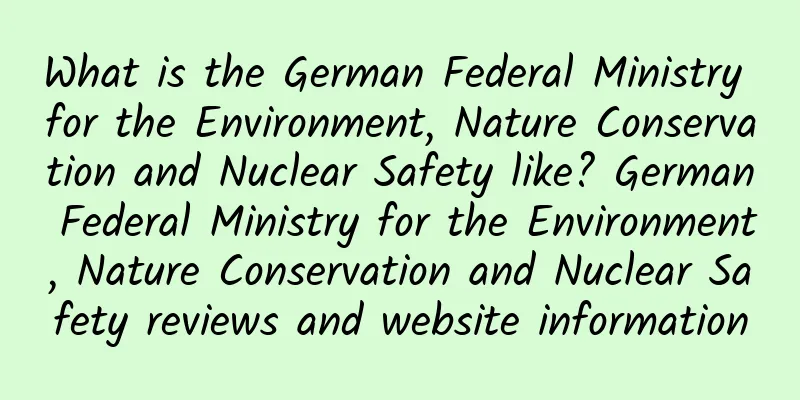What is the German Federal Ministry for the Environment, Nature Conservation and Nuclear Safety like? German Federal Ministry for the Environment, Nature Conservation and Nuclear Safety reviews and website information

|
What is the website of the German Federal Ministry for the Environment, Nature Conservation and Nuclear Safety? The German Federal Ministry for the Environment, Nature Conservation and Nuclear Safety (German: Bundesministerium für Umwelt, Naturschutz und Reaktorsicherheit; abbreviated as: BMU) is one of the German federal government departments. It was established in 1986 and is headquartered in Bonn with a second office in Berlin. Its main responsibilities include climate protection, environment and energy, renewable energy, international cooperation; nuclear power facility safety, radiation protection, nuclear fuel cycle; water resource management, waste management, soil protection; environmental health, injection control, device safety and transportation, chemical safety; nature conservation and sustainable use of natural resources, etc. Website: www.bmub.bund.de The German Federal Ministry for the Environment, Nature Conservation and Nuclear Safety (Bundesministerium für Umwelt, Naturschutz und Reaktorsicherheit, BMU for short) is an important department of the German federal government, established in 1986. The department is headquartered in Bonn and has a second office in Berlin. The main responsibilities of the BMU cover a wide range of environmental and energy fields, aiming to promote sustainable development in Germany through policy formulation and implementation, and to ensure a balance between environmental protection and economic development. BMU's responsibilitiesThe scope of responsibilities of the BMU is very broad, mainly including the following aspects:
Historical Background of BMUThe BMU was established in 1986, at a time when global attention to environmental issues was increasing. Germany's environmental protection policy was further developed and improved during this period. The establishment of the BMU marked that the German government has elevated environmental protection to a new level and made it an important part of national policy. Since its establishment, BMU has played an important role in promoting environmental protection and sustainable development in Germany. The department has not only formulated and implemented a series of effective environmental policies at home, but also actively participated in global environmental governance on the international stage and promoted the conclusion and implementation of a number of international environmental agreements. BMU's organizational structureThe organizational structure of BMU is divided into several departments and institutes, each of which is responsible for specific areas and tasks. The following are the main departments and institutes of BMU:
Major achievements of BMUSince its establishment, BMU has made remarkable achievements in environmental protection and sustainable development. The following are some of its major achievements:
Future prospects of BMUAs global environmental issues become increasingly severe, BMU will continue to play an important role in the future. The following are the main work directions of BMU in the future:
ConclusionThe German Federal Ministry for the Environment, Nature Conservation and Nuclear Safety (BMU) has played an important role in promoting environmental protection and sustainable development in Germany. By formulating and implementing a series of effective policy measures, BMU has made remarkable achievements in climate protection, energy transition, international cooperation, nuclear power facility safety, water resource management, waste management, soil protection, environmental health, chemical safety, nature conservation and sustainable use of natural resources. In the future, BMU will continue to play an important role in promoting Germany's efforts in environmental protection and sustainable development, responding to global environmental challenges and achieving sustainable development goals. |
<<: What is Asahi Kasei Corporation like? Reviews and website information of Asahi Kasei Corporation
>>: How is BBC Learning English? BBC Learning English Review and Website Information
Recommend
The benefits of celery teach you how to make delicious celery
Many people like to eat celery. Celery is very nu...
The benefits of eating egg noodles
Egg noodles are a kind of noodles made by adding ...
The efficacy and function of brewing vinegar
Brewing vinegar is usually a common condiment, bu...
How to eat syzygium wilfordii? How to eat syzygium wilfordii?
Syzygium wilfordii is a tropical fruit that looks...
How about Alamo Car Rental (Argentina)? Alamo Car Rental (Argentina) reviews and website information
What is Alamo Car Rental (Argentina)? Alamo Car Re...
The efficacy and function of red cloves
Red lilac is one of the lilac plants we are famil...
How is Jiman Paper? Jiman Paper reviews and website information
What is the website of Büttenpapierfabrik Gmund Gm...
The efficacy and effects of eating pitaya and the taboos of eating pitaya
As people's health awareness has increased, e...
How to make pepper porridge
I wonder if you know how to make pepper porridge?...
Black bean consumption methods and therapeutic effects
Black beans are a common bean ingredient that is ...
The nutritional value of Arctic sweet shrimp and the effects and functions of Arctic sweet shrimp
Nutritional value of Arctic sweet shrimp Arctic s...
Effects and functions of ebony
Have you ever eaten black plum? Do you know what ...
How to make delicious dried cuttlefish
Dried cuttlefish is a very good seafood. Now let&...
How to pickle green plums? The easiest way to pickle green plums
During the Qingming Festival, green plums are rip...
How is the Travel with Pets website? Reviews and website information of the Travel with Pets website
What is Tripswithpets.com? Tripswithpets.com is a ...









